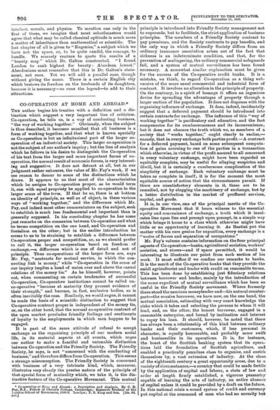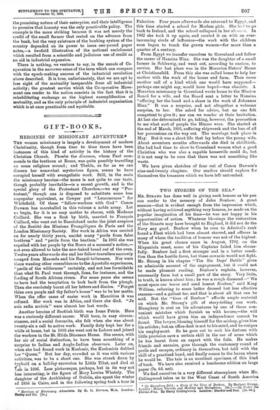CO-OPERATION AT HOME AND ABROAD.*
THE author begins his treatise with a definition and a dis- tinction which suggest a very important line of criticism. Co-operation, he tells us, is a way of conducting business, "the way of working together." Obviously, when the subject is thus described, it becomes manifest that all business is a form of working together, and that what is known specially as Co-operation is but an infinitesimal part of the larger co- operation of an industrial society. This larger co-operation is not the subject of our authois inquiry ; but the line of analysis which he follows in his desire to distinguish the Co-operation of his text from the larger and more important forms of co- operation, the normal result of economic forces, is very interest- ing and suggestive. It does not detract at all, but in our judgment rather enhances, the value of Mr. Fay's work, if we see reason to demur to some of the distinctions which be draws. It appears to us that most of the characteristics which he assigns to Co-operation proper, as he would term it, can with equal propriety be applied to co-operation in the larger sense of the term. If that be so, there is at bottom an identity of principle, as well as of object, in these various ways of "working together," and the difference which Mr. Fay, and indeed most other commentators on the subject, seek to establish is much less fundamental and important than is generally supposed. In his concluding chapter be has some just remarks on the connexion between Co-operation and what he terms competition on the one hand, and Co-operation and Socialism on the other; but in the earlier introduction he seems to us to be straining to establish a difference between Co-operation proper and competition,- or, as we should prefer to call it, the larger co-operation based on freedom of exchange,—a difference which is one of detail and not of principle. Thus co-operations of the larger form are, says Mr. Fay, "contracts for mutual service, in which the con- necting link is money," while "Co-operation in the sense of our inquiry implies a bond of union over and above the casual relations of the money tie." As he himself, however, points out, when commenting on certain tendencies of successful Co-operation, Co-operative institutions cannot be called un- co-operative "because at maturity they present evidence of their strength," and become, in fact, exclusive bodies, as is often inevitably the case. Similarly, we would argue, it cannot be made the basis of a scientific distinction to suggest that Co-operative contract proper is independent of the money tie, or, on the other hand, that the normal co-operative contract of the open market precludes friendly feelings and sentiments of loyalty to the employments in which men happen to be engaged.
It is part of the same attitude of refusal to accept exchange as the organising principle of our modern social life, in its material aspects at all events, which urges our author to make a fanciful and untenable distinction between Co-operation and the Friendly Society. The Friendly Society, he says, is not "concerned with the conducting of business," and therefore differs from Co-operation. This seems a strange misconception. The Friendly Society is concerned with business of a very intricate kind, which, moreover, illustrates very clearly the precise nature of the principle of that special form of mutuality which, we take it, is the dis- tinctive feature of the Co-operative Movement. This mutual
• Co-operation at Horne and Abroad: a Description and Analysis. By C. B. Fay, B.A., Fellow of Christ's College, Cambridge ; Research Student at the London School of Economics, 1966-8, London P. S. King and Son. [10s. 6d. net.]
principle is introduced into Friendly Society management not to supersede, but to facilitate, the strict application of business principles. The members of a Friendly Society contract to pay premiums, and the Society contracts to pay benefits, and
the only way in which a Friendly Society differs from an ordinary insurance association arises out of the fact that sickness is an indeterminate condition, and that, for the prevention of malingering, the ordinary commercial safeguards fail, and a system of mutual surveillance has been found necessary. A somewhat similar explanation must be given for the success of the Co-operative credit banks. It is a mistake, we think, to regard Co-operation as a thing sub- versive of the more usual commercial and industrial form of contract. It involves no alteration in the principle of property. On the contrary, in a spirit of homage it offers an ingenious device for spreading the advantages of property through a larger section of the population. It does not dispense with the organising influence of exchange. It does, indeed, incidentally suggest that a deferred payment should be introduced into certain contracts for exchange. The influence of this "way of working together" is pacificatory and educative, and the fact compensates for its cumbersomeness and its inconvenience; but it does not obscure the truth which we, as members of a society that "works together," ought clearly to realise,— namely, that in every exchange both parties profit.—A contract for a deferred payment, based on some subsequent computa- tion of gains accruing to one of the parties in a transaction which otherwise, in virtue of the profit assured to all ooncerned in every voluntary exchange, might have been regarded as equitably complete, may be useful for allaying suspicion and illwill, but it is certainly a cumbersome complication of the simplicity of exchange. Each voluntary exchange must be taken as complete in itself; it is for the Moment the most equitable source of action that the circumstances permit. If there are unsatisfactory elements in it, these are to be remedied, not by clogging the machinery of exchange, but by a better distribution in the market of proffered services, capital, and goods.
It is, in our view, One of the principal merits of the Co- operative Movement that it bears witness to the essential equity and convenience of exchange, a truth which it incul- cates line upon line and precept upon precept, in a simple way which brings it home to a class which otherwise might have little or no opportunity of learning it. As Bastiat put the matter with his rare genius for exposition, every exchange is a "union of forces and separation of occupations."
Mr. Fay's volume contains information on the four principal aspeote of 'Co-operation—banks, agricultural societies, workers' societies, and stores—and if space permitted, it would be interesting to illustrate our point from each section of his work. It must suffice if we confine our remarks to banks. It is the merit of the Co-operative banks that they provide the small agriculturist and trader with credit on reasonable terms. This has been done by establishing just fiduciary relations between borrower and lender, mainly by the introduction of the same expedient of mutual surveillance which has been so useful in the Friendly Society movement. Where formerly there stood the usurious moneylender and-his natural counter- part—the evasive borrower, we have now, on the one hand:the mutual association, estimating with very exact knowledge the risks which it takes and selecting the persons to whom it will lend, and, on the other, the honest borrower, engaged in a reasonable enterprise, and bound by inclination and interest to repay his loan. It should, however, be noted that there has always been a relationship of this kind between ordinary banks and their customers, which, if less personal in character, is equally honourable, and probably more swift and businesslike in its operations. It is, for instance, the boast of the Scottish banking system that its opera- tions laid the foundation of Scottish agriculture, and enabled a practically penniless class to organise, and enrich themselves by, a vast extension of industry. At the close of the eighteenth century a great opportunity arose, due to a variety of circumstances,—a country that could be made fertile by the application of capital and labour, a state of law and order at length firmly established, a vigorous peasantry capable of learning the arts of industry, an entire absence of capital unless it could be provided by a draft on the future. In this national crisis a sound system of credit and currency put capital at the command of men who had no security but
the promising nature of their enterprise, and their intelligence to perceive that honesty was the only practicable policy. The example is the more striking because it was not merely the credit of the small farmer that rested on the advance from the bank, but the very existence of the banking system of the country depended on its power to issue one-pound paper notes,—a twofold illustration of the national enrichment which resulted from a scientific and judicious use of credit as an aid in industrial expansion.
There is nothing, we venture to say, in the annals of Co- operation in the narrower sense of the term which can compare with the epoch-making success of the industrial revolution above described. It is true, unfortunately, that we are apt to lose sight of the mutuality inseparable from all industrial activity; the greatest service which the Co-operative Move- ment can render to the nation consists in the fact that it is rehabilitating exchange as the highest exemplification of mutuality, and as the only principle of industrial organisation which is at once practicable and equitable.

































































 Previous page
Previous page